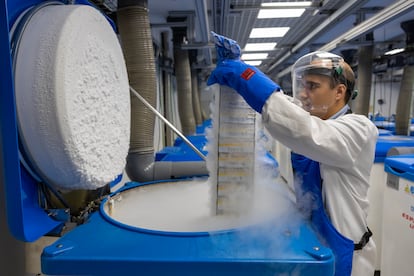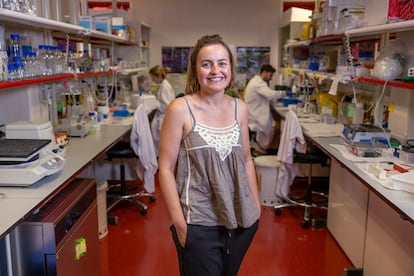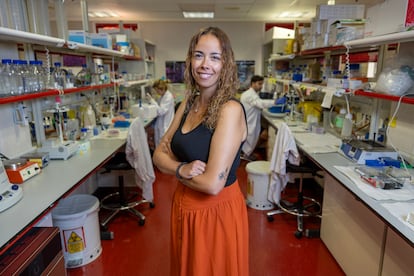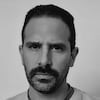Biological samples from flight attendants may shed light on how jet lag affects health
Two researchers are studying the effects of lack of sleep on the immune system. Some studies have linked this to an increased likelihood of suffering coronary events. It is also thought to raise the risk of cancer

Can jet lag — caused by the imbalance between the social, solar and internal clock — make us more vulnerable to diseases such as cancer? That is a question that scientists at Spain’s National Cancer Research Center (CNIO) are trying to decipher. The answer may lay in the CNIO’s chilly basement, where enormous freezers hold the first ever collection of biological samples taken from cabin crew members.
Cabin crew must constantly deal with jet lag and its resulting health impacts. “It’s like a hangover, when you’re young you can handle it and recover quickly, but as you get older it becomes more difficult,” explains Virginia López del Alcázar, head of professional health at the Spanish Association of Cabin Crew.
López del Alcázar — who was formerly a cabin crew member — explains that her colleagues believe they suffer higher rates of illness, but don’t have the data to back it up. To address this issue, López del Alcázar contacted the CNIO and proposed providing the organization with biological samples so that it could scientifically study the health impact of jet lag. Since 2021, more than a hundred flight attendants have been donating blood, saliva, nails, feces and urine twice a year, as part of longitudinal research that has already identified patterns and trends.
María Jesús Artiga is the acting scientific director of the CNIO biobank. The facilities are impressive. Dozens of containers hold some 50,000 samples from nearly 9,000 donors. “The numbers are dizzying, but this is a small biobank compared to a hospital’s,” she explains. “It doesn’t matter, ours has a different concept.” The samples are kept at -196ºC and can only be removed with thick gloves and a face shield. “Here we have opted to have strategic collections, aimed at a specific line of research,” she explains.
Biologists Alba de Juan and María Casanova-Acebes were the first to take an interest in this collection. Three floors up, in their laboratory, they explain that their idea is to understand the circadian rhythms of healthy and cancerous cells. The researchers’ goal is to dissect these biological clocks in order to analyze their mechanisms, and understand whether they can be synchronized to minimize the impact of disease. They also want to see what happens to our immune system when we stop sleeping. “We think that in people with a changed schedule, the number and function of their leukocytes are no longer optimal,” explains De Juan. “We believe that their immune system is altered. Now we have to prove it.”

Our internal clock sets the circadian rhythms: the biological changes that follow a 24-hour cycle and create a kind of cellular work schedule. At mealtime, our cells secrete certain proteins. An internal alarm sounds because it is time to sleep, and others proteins are released. The next day, the immune system wakes up and the number of white blood cells increases, but the number decreases at nightfall. Everything is synchronized with solar rhythms thanks to millennia of evolution and adaptation to the environment. Disrupting these schedules can impact our health, as scientific research has started to show.
Long-term night work is associated with weight gain. It has also been suggested that it increases the risk of coronary heart disease. But less proven is its relationship with cancer. The International Agency for Research on Cancer classifies work that alters circadian rhythms as “probably carcinogenic.” This means that while there is “sufficient experimental evidence” in animals, there is “limited” evidence on the impact in humans.
A study by the University of Huelva in Spain analyzed a group of nurses who worked shifts, and noted “significant associations between breast cancer and prolonged rotating night shifts.” It also found a relationship between alterations in certain circadian rhythm markers (such as melatonin), epigenetic markers (such as telomeres) and breast cancer. It, however, indicated that “more studies” were needed to corroborate the findings. And this is what De Juan and Casanova-Acebes intend to do.
Altering our circadian rhythms can make us more vulnerable to diseases, but understanding them can be the key to combating diseases. Because viruses, bacteria and cancer cells also seem to be governed by a schedule and an internal clock. Fever usually rises after eating or first thing in the morning. Coughing fits are often more violent at night. “Researchers have to confirm or refute this observational part through experiments,” confirms Casanova-Acebes. De Juan agrees, explaining that the goal is to “give a scientific basis to popular wisdom.”
Their study is striking, but not unique. In recent years, the focus in health has not just on the what and the how, but also on the when. “It has been proven that heart attacks occur more frequently in the morning,” explains Casanova-Acebes. “And that is because there is a greater concentration of inflammatory cells and platelets. Therefore, it is better to give a person who has a blood clot anticoagulants at night, giving them time to act.”
Studies are also investigating whether the time at which cancer treatments are administered may be important, and the provisional results — although limited — seem to suggest that this is the case. The CNIO research project could explain why. Although it is still too soon to reach conclusions, say the biologists. They believe it will take another 18 months to analyze the data. But they are optimistic: unlike other similar investigations, they have access to a large, longitudinal collection. The researchers are comparing how cells evolve in three groups of people: individuals that go on long-distance trips, individuals who go on medium-distance trips, and a third, a control group, made of people who hardly travel at all.

Their work could have studied people with chronic sleep deprivation, but they wanted to analyze flight attendants and not people with insomnia for a clear reason. “Insomnia has a very complicated case history,” explains De Juan. “It can be caused by damage to the brain or cognition, and that adds a certain distortion [to the data]…”
The biologist explains that anxiety causes insomnia, and we live in an anxious society. This has an impact on circadian rhythms and, in turn, on our health. “With this issue, we could see a similar impact that took place with industrial sweets, when studies years ago showed that it was important to take care of our diet. Thanks to studies like the one we are doing, we will be able to see the importance of maintaining a healthy circadian rhythm. And this means not only being more protected against cancer, but also to fight against any type of disease or infection.”
Circadian rhythms are set by our internal clock, but are synchronized with the external clock, with the cycles of the sun and the moon. The use and abuse of artificial light, nighttime work, air travel and the resulting jet lag, affect this synchronization. Different studies indicate that this can compromise not only our mental health but also our physical health. Our body is affected in ways that we still do not fully understand. The work of the CNIO scientists aims to shed insight on this issue, and establish measures to address the health effects.
Sign up for our weekly newsletter to get more English-language news coverage from EL PAÍS USA Edition
Tu suscripción se está usando en otro dispositivo
¿Quieres añadir otro usuario a tu suscripción?
Si continúas leyendo en este dispositivo, no se podrá leer en el otro.
FlechaTu suscripción se está usando en otro dispositivo y solo puedes acceder a EL PAÍS desde un dispositivo a la vez.
Si quieres compartir tu cuenta, cambia tu suscripción a la modalidad Premium, así podrás añadir otro usuario. Cada uno accederá con su propia cuenta de email, lo que os permitirá personalizar vuestra experiencia en EL PAÍS.
¿Tienes una suscripción de empresa? Accede aquí para contratar más cuentas.
En el caso de no saber quién está usando tu cuenta, te recomendamos cambiar tu contraseña aquí.
Si decides continuar compartiendo tu cuenta, este mensaje se mostrará en tu dispositivo y en el de la otra persona que está usando tu cuenta de forma indefinida, afectando a tu experiencia de lectura. Puedes consultar aquí los términos y condiciones de la suscripción digital.









































